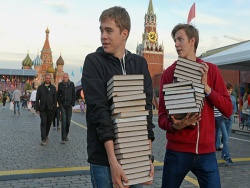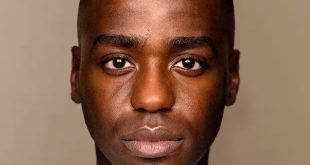
As breakdown in North Korean literature
Whatever the relations between Moscow and Pyongyang, Russian characters in the North Korean works always evoke sympathy. This blue-eyed heroes with a subtle mind and a penchant for playing music. Even if Russian and North Korean hero of the novel is drinking, he is not drunken and rollicking, and the setting is beautiful reverie. What other traits give Russians the authors of the DPRK and how they generally relate to Russia, to find out “Ribbon.ru”.
Almost like home
When in 2014 I came to Pyongyang, “the most closed country in the world” seemed to me like one of the former Soviet republics. And it’s not just a common socialist roots of the DPRK and the USSR. At every step in Pyongyang felt the influence of Russian culture. To suspect the receiving side in the desire to specifically call your attention to it, which was in the DPRK I came to the delegation of Singapore.
In an ordinary Pyongyang theater, past which was driving our car, was a Soviet film about the war. The driver in the car consisted of recordings of Russian and Soviet songs. On the question of what he listens to, he replied: “a Good song. Russian, about the hope.”
In the private restaurant where went for lunch, our delegation, twisted Russian clips. Even some of the dishes, despite the authentic Korean names, were clearly relatives of Russian cabbage pies and casseroles from the Soviet kindergarten. And swirls of mayonnaise adorning these casseroles, and even forced to melt my heart. Accompanying young on the question of whether the North Koreans used this sauce in a home kitchen, said confidently: “of Course. He’s tasty”.
In Pyongyang I was lucky enough to interview my favorite Korean actors. In my official title of “doctor of the Australian national University,” they reacted with suspicion, but when I mentioned that grew up and studied in Russia, strict restraint were replaced with smiles and warm memories of Moscow, where they had once been.
With such a radical change as I have had to encounter in Seoul when dealing with defectors from the DPRK, in which I was interviewed about North Korean culture. These people cannot be suspected of sympathy for socialism, but they bloom and smile every time I put the Australian business card and tell you that learn Korean in Vladivostok.
To be sure, this sympathy has many causes, and last but not least is the quality of our diplomatic activity in Pyongyang for decades. Our diplomats know Korean language, they belong to the country and the people with sincere interest and respect. But there is another reason — this is the official position of the North Korean culture. Whatever challenges experienced relations of our countries, no matter how challenging the political differences, attitudes toward the Russian people that was broadcast to the North Korean culture, has always been positive.
The beginning of the novel
In 1945 the Red army liberated Korea from the Japanese colonizers and established in the North a friendly regime headed by Kim Il-Sung. The first eight to ten years the relations between the DPRK and the USSR could be called Roman: the Russia he loved. Korean culture has glorified the Soviet liberators and the Soviet way of life. For Koreans in those years the USSR was a social ideal, where ideas of education and development co-existed with ideas of social and national equality. Young North Koreans dream to go there to learn, and to care for a Russian girl was considered as good as for the Soviet guy in those years — to have an affair c Parisienne.
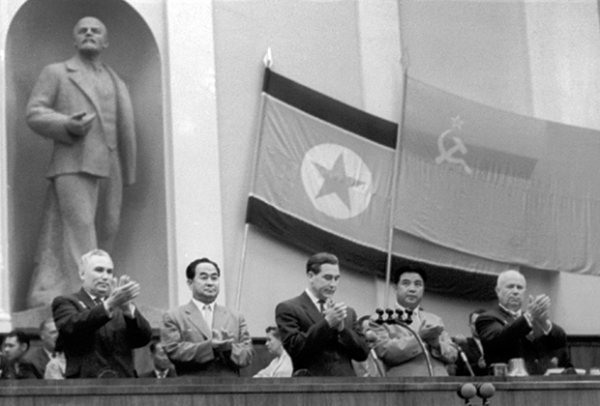
Rally of friendship between the peoples of the USSR and the DPRK. 1961
Photo: Sergey Preobrazhensky / TASS
However, after 1953 official relations began to change. In the Soviet Union began the thaw, which Kim took, being a staunch supporter of Stalin’s leadership style. We also seemed to caricature the mobilization dictatorship, Kim Il sung, freed from Soviet control, began to establish in the country. Reciprocal differences were evident, however, until a full-fledged quarrel is not reached, because a bad peace was necessary for both parties. The DPRK needed Soviet economic and political support, the Soviet Union needed at least a conditional ally in a difficult region. Therefore, the parties refrain from open mutual criticism.
“Deeper than the sea”
To understand how imagined our relationship Korean side, worth reading, North Korean fiction of the time. The story of Hwang Chu-EEA “Fedya”, printed in 1960 in the magazine “Korean literature”, can be seen as an allegory of the changes that occurred between the USSR and the DPRK after the death of Stalin.
Fedya — Russian engineer, leading a team of welders on Korean advanced Korean construction. He is beloved by his subordinates, take care “like a mother”. In his free time, he plays for Koreans the accordion and sings Cossack songs in a pleasant, musical voice. It is so like the Koreans that heard Fedin accordion, they “come running at the sound”. He and his team “worked tirelessly” to finish the job ahead of schedule.
Soon he notices that the welding hurt eyes, and discovers that the reason is low-quality protective masks. He appealed to the authorities to immediately replace them, but they answered that in the country there is a large — scale construction of the mask in the deficit. He forbids his crew to come to work until the problem is resolved. He explains his subordinates that because of the poor quality of the masks you can lose vision. The Koreans, however, secretly violate his order and, at the risk of blindness, I continue to work to complete the project ahead of schedule.
Fedya angry incomprehensible obstinacy of the Koreans and confronts the brigade. Both sides of the quarrel is given very hard — working, and Russian engineer suffer from losing each other. However, after much deliberation he decides that he was wrong. Koreans are very special people, and keep them from work impossible. Instead of getting angry at their “irrational” behavior, he have to admire their devotion to the Leader and to make every effort to help the Koreans to achieve high goals.
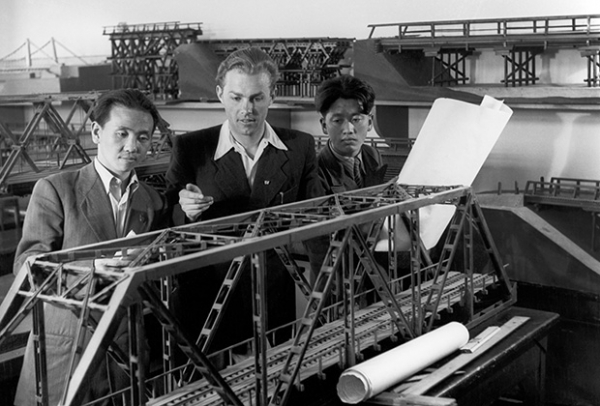
North Korean students ‘ studies in the USSR. 1959
Photo: Mikhail Ozersky / TASS
Fedya calls to Moscow to his wife Marusya, and the next day she will fly to Pyongyang and delivers the desired mask. Fedin brigade welcomed the gesture as another sign of the Soviet-Korean friendship, which is “a deeper sea”. Together they work on a construction site with even greater enthusiasm.
Of course, Fedya was conceived as a goodie. As all Goodies of Korean literature, he is depicted a handsome man with blue eyes and Golden curls. But Fedya is a foreigner, he was not able to really feel the soul of the Korean, able to sacrifice to please the Leader. The only thing Russian can do selflessly to help the Koreans in their activities, not discussing her high sense. Here is the model of the Soviet-Korean friendship (the one that is “deeper than the sea”) offers us the story.
With all tragicomically described in the story situation, Hwang Chu-Tu has correctly caught the essence of the conflict between the DPRK and the USSR. We were divided not only against the leader, but also related to personal interests of ordinary people.
And it’s not only in the Khrushchev thaw. Even in the dogmatic Soviet literature it is impossible to imagine the story, when the characters deliberately blind to Stalin enjoyed their enthusiasm. If the USSR’s mobilization of the economy and tighter belts was seen as an exceptional measure in case of emergencies, Kim Il sung, created the country where the work is at the maximum tension force was considered the norm and any personal interest, by definition, was sinful. If the leaders of our socialist realism shortly after the war in a hurry to make films-social promises like “the Kuban Cossacks”, full of fun dances, songs and richly laid tables, the films of the DPRK good appetite has always been a key feature of the way of a scoundrel.
Cold friendship
Relations between the DPRK and the USSR in 1960-1980’s by analogy with cold war can be called a cold friendship. Strict ties of real politics kept both sides in the framework of the discourse of the “socialist Commonwealth”. Despite the blatant inconsistency of the Brezhnev of the USSR the high ideals of Juche, despite the fact that on the magazine “Korea” laughed we all hairdressers, where these magazines somehow always lay, not a single bad word against each other out onto the pages of the press of both countries.
Our critique of “revisionism”, which he sometimes allowed himself the Koreans in party publications, was conducted in a veiled form so that the Soviet side could ignore these attacks on deaf ears. Our materials of North Korea were mainly household stories from the life of “brotherly people” and did not address the slippery Juche and the cult of the leader.
No one spat in another well, and therefore it was possible to conduct a joint business.
In the end, somewhere in the mid-80s cold friendship suddenly warm. Korean culture has experienced a new Renaissance, and associated with another divorce with China, and a General democratization of the situation that has characterized the last decades of the reign of Kim Il-Sung.
North Koreans began again to send to study in the USSR. After a long break, he published poetry Soviet Korean Cho, Ki-CHEON (Those Gecina), considered the founder of the poetry of the DPRK. Released a joint Soviet-Korean movies about Russians who participated in the liberation of Korea from Japanese domination: “Second deed”, devoted to the feat of Yakov Novichenko, blocking a Kim Il-Sung grenades from terrorists in 1946 and “the Tired sun” — about the heroism of the nurse Maria Tsukanova, who died at the hands of the Japanese during the assault of Chongjin in 1945.
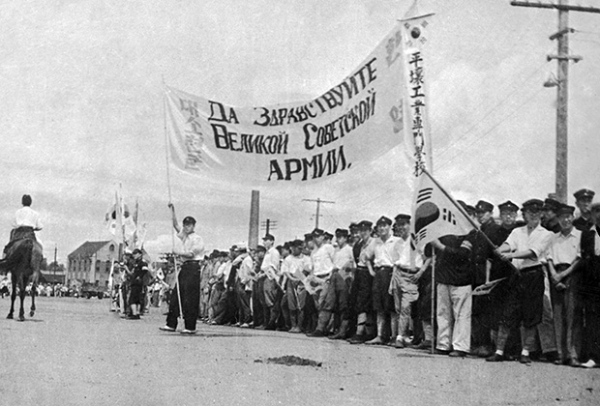
A meeting of Soviet troops in the border city of Sinŭiju. 1945
Photo: RIA Novosti
In Korean literature again flashed the names of the Russian and Soviet heroes in these works started to behave much more adequately by North Korean standards, restless than Fedya. In the story Yoon Kyung-Joo “Red roses of Siberia” (1986) Russian heroine, a young doctor from Siberia, eating kimchi for dinner CCIE and plays for relaxation piano North Korean marches. Her Russian lover seeks her heart that gets to come to Russia with the visit of North Korean leader a bouquet of red roses. Needless to say that Russian doctor — a real beauty with her big eyes and curls to her shoulders.
Restructuring as an alternative scenario
The Renaissance ended as quickly as it had begun. In the USSR, perestroika began, and the thought of the national interest has ceased to bind the hands and tongues of the leadership of the national press.
If in Soviet times, the DPRK journalists wrote with a good education, moral intuition and taste (often these were graduates of faculties of Korean living in Pyongyang not one year), since the beginning of the 90s the theme of the DPRK were entirely different people. In their articles confused the names of the leaders and the names of cities (Pyongyang, for example, might be called Phnom Penh), but zhivopisets Orgy North Korean leaders and relished the details of which began in North Korea hunger.
Official representatives of the DPRK was trying to protest against a particularly aggressive attacks in the address, press the workers ‘ party cursed restructuring as a defeat of socialism in the struggle against capitalism. But North Korean culture kept silent about Russia and Russians. It seemed that Korean writers was gathering my thoughts and watching the former Soviet Union. They are ripe to the early 2000s, sired by several stories about the collapse of the Union.
While crushing criticism of the post-Soviet changes (destroyed industry and education, the cult of Commerce, the decline of morality and international reputation, the Russian girls in the role of prostitutes, homeless children, scientists fleeing the country to work on opponents) in these works there is no bitterness toward the Russians itself. With the exception of Gorbachev and Yeltsin all the Russian characters are drawn with compassion and sympathy, despite the fact that the collapse of the country, according to the authors, happened their fault.
In North Korean literature zero Russian people appear kind, sincere and educated, who built a wonderful fair country. Ruined their faith in the stories about the overseas wealth. Like stubborn children, they refused to listen to his mom, a party, preferring the life of a purely individualistic, and this has allowed the traitor Gorbachev let in the country of the imperialists who have destroyed the USSR.
The lesson of the North Korean frogs
A typical example of such story — “the Fifth photograph” rim Hwa-won (2001).
North Korean translator of the Escarpment, while on a business trip in Russia, meets a beautiful girl Katya Sintsova selling to passers-by on the streets of Moscow, his photos are widely known in the USSR family of party workers. For provocative manners girl guesses Escarpment bruised soul Katie.
Shortly after this Escarpment accidentally saves Katya’s brother Sergei, who is hit by a car, and without stopping, carried on. The escarpment takes the young man to hospital and after recovery of Sergey they become friends.
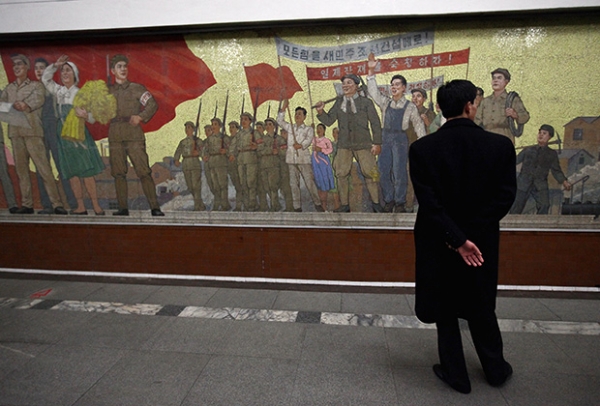
The daily life of Pyongyang
Photo: Feng Li / Getty Images
She learns that under the car, Sergey has got from mental disorders. Three generations of family Sincovich were faithful sons of the party. Great-grandfather organized the collectivization in the village, grandfather died in the great Patriotic, his father was Secretary of the Moscow city CPSU Committee, sincerely devoted to the ideas of Lenin. Sergei walked in their footsteps, becoming a Komsomol leader. Kate, with the remaining childhood without a mother, was the favorite in the family. However, enrolling in the art Institute, Kate came under Western influence, and clashed with his father and brother, who were considered “naive idealists”.
During the party she met a visiting American Makkhali who seduced her, but after learning that she was pregnant, dumped her and went home. Katya had an abortion.
At this time the country begins rebuilding, and the father, overwhelmed by the misfortunes of his daughter and the collapse of the country, dies of a heart attack with the words “long live the CPSU!”. Kate mourns father, but continues to regard him as a fool.
Kate goes out to find her beloved in the U.S. and is found there with him, to know that her seduction was a set-up like revenge of the famous party family. Makkhali turns out to be the grandson of a peasant, who had dispossessed the great-grandfather of Katie. For Katya, there comes a moment of Epiphany. She understands how right were her father and brother, who warned her that capitalism is a formidable enemy.
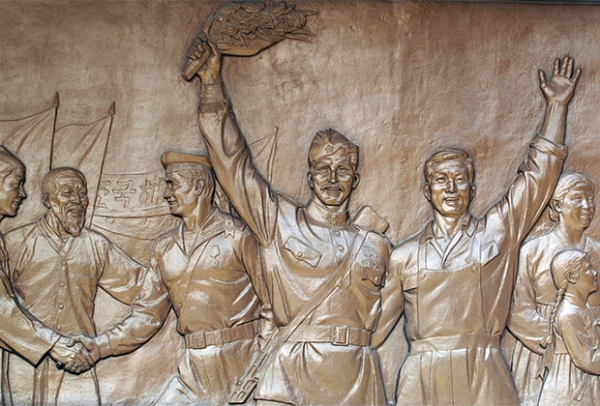
A fragment of the monument “Liberation” in Pyongyang
Photo: juche_songun Livejournal
Suffering from shame and hopelessness, Kate settles in Munich, where he became a prostitute. She writes his brother a letter of repentance. In a road traffic accident Katya Sintsova loses a leg, and it extends to her Western perverts. Colleague Sergei, while on business in Munich, brings him a flyer with photographs of prostitutes in the Munich hotel where there is a portrait, painted very thick Katie. This infamous portrait is the “fifth photo”, ended the history of the revolutionary family. Sergei sends the Escarpment a copy of the letter of Kate and her latest photo — “for the edification of the people of the DPRK”.
The escarpment comes home. Her husband holds a high post in the people’s army, there successfully are brave twin sons. Fifteen-year-old daughter of the Escarpment, a talented violinist, she refuses granted the honor to enter the Conservatory and decides to join the army, because the Motherland needs soldiers. The escarpment tells her daughter about Kate. Both worried about the deceived Russian people and were the more determined to rally around the Leader.
As can be seen from this tragic Saga, the North Korean version of perestroika plays the popular Korean story of the frog that brought the mother to the grave by his disobedience and then to the end of the world was suffering, aware of his guilt. But, unlike the traditionally pessimistic tales, in stories about the rebuilding there is always a note of optimism. Russian and world communism is the Savior. This, as you might guess, the people of the DPRK.
A Disciple Of Kim Jong-Il
What works in the North Korean Russians become effective background for the beautiful in all respects Koreans, unsurprisingly. This is the role of foreigners in all the works of mass culture, describing foreigners for the native audience — just think of Hollywood, though South Korean drama. More important, in my opinion, here is a list of the qualities attributed to “background aliens”.
For example, the Chinese, despite all assurances of mutual friendship, the North Koreans are always portrayed as these savages — “on the person awful, kind inside”, that is people full of good intentions, but it is extremely tactless, uncultured and not too bright. Typical Russian hero of North Korean literature demonstrates a complete kit, Korean intellectual: subtle mind and intelligence, the kindness, the propensity to reflection and sadness, mandatory possession of a musical instrument, a beautiful voice. In this list there is no quality caricature of a Russian villain in American standard style “bath-vodka-squeeze-and-salmon”: no rudeness, no aggression or alcoholism. In the North Korean and Russian works if drinking, always in the setting is beautiful in thought and hopeless longing. In other words, behaves as an ideal hero of classical Korean literature.
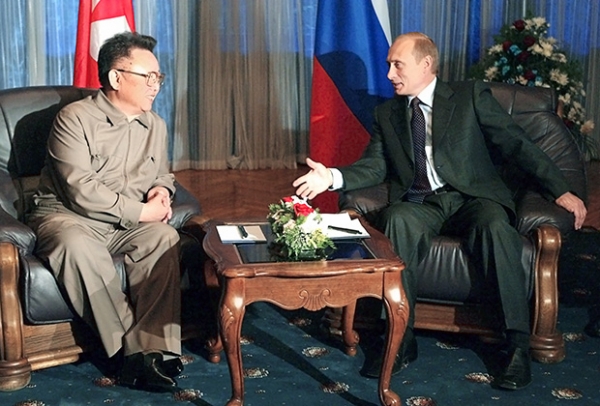
Vladimir Putin and Kim Jong-Il
Photo: Vladimir Rodionov / RIA Novosti
And most importantly — a Russian hero in a North Korean stories are always beautiful. Unlike the Russian barbarian from a Hollywood Thriller — with bleary eyes, broken nose Boxing, and certainly clean-shaven head. Regular features of Russian from the North Korean story — big blue eyes, high forehead and, of course, light brown curls.
Perhaps only one Russian character, North Korean literature is represented with no unruly curls. Is Vladimir Putin. However, he has a delicate soul and a reflection characteristic of the Russian and Korean intellectuals. In the story “dawn” writer Jeon Yong-Jong (2001) model respect for Kim Jong Il three years of mourning for a deceased father so impressed the President of Russia that he decided to leave the previous policy of neglect by the traditions of Russia and become a national oriented leader like Kim Jong Il.


